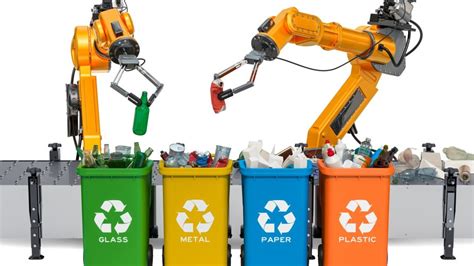The world is facing a significant challenge in managing waste effectively. The ever-increasing population, urbanization, and consumerism have led to a substantial rise in waste generation, posing severe environmental and health concerns. However, with the integration of high-tech recycling solutions, the waste management industry is undergoing a significant transformation.
Challenges in Traditional Waste Management
Traditional waste management systems have several limitations, including:
- Inefficient waste collection and segregation
- Lack of advanced recycling technologies
- High labor costs and manual sorting
- Limited public awareness and education
- Inadequate waste disposal facilities
These challenges have led to the accumulation of waste in landfills, causing environmental pollution, health hazards, and economic losses.
Emergence of Hi-Tech Recycling Solutions
The advent of high-tech recycling solutions has revolutionized the waste management industry. Some of the key technologies include:
- Artificial Intelligence (AI) and Machine Learning (ML): AI-powered sorting machines can identify and sort recyclables with high accuracy, reducing manual labor and increasing efficiency.
- Internet of Things (IoT): IoT sensors can monitor waste generation, collection, and disposal in real-time, enabling data-driven decision-making and optimizing waste management processes.
- Robotics and Automation: Robots can sort and process recyclables faster and more accurately than humans, reducing labor costs and improving safety.
- Advanced Recycling Technologies: New recycling technologies, such as chemical recycling and biological recycling, can recover valuable materials from waste, reducing landfill waste and promoting a circular economy.

Benefits of Hi-Tech Recycling Solutions
The integration of high-tech recycling solutions offers numerous benefits, including:
- Improved Efficiency: Automation and AI-powered sorting machines can increase recycling rates and reduce labor costs.
- Enhanced Accuracy: Advanced technologies can identify and sort recyclables with high accuracy, reducing contamination and improving the quality of recyclables.
- Increased Public Awareness: IoT sensors and data analytics can provide insights into waste generation and disposal, promoting public awareness and education.
- Job Creation and Economic Growth: The development of high-tech recycling solutions can create new job opportunities and stimulate economic growth.
- Environmental Benefits: High-tech recycling solutions can reduce greenhouse gas emissions, conserve natural resources, and mitigate the environmental impacts of waste disposal.
Real-World Examples of Hi-Tech Recycling Solutions
Several cities and companies are already implementing high-tech recycling solutions, including:
- Singapore's Smart Waste Management System: Singapore has implemented an IoT-based waste management system, which uses sensors to monitor waste generation and disposal in real-time.
- Waste Management's Recycling Facilities: Waste Management, a leading waste management company, has invested in advanced recycling technologies, including AI-powered sorting machines and robotics.
- The City of Toronto's Recycling Program: The City of Toronto has launched a recycling program, which uses advanced recycling technologies, including chemical recycling and biological recycling, to recover valuable materials from waste.

Challenges and Limitations of Hi-Tech Recycling Solutions
While high-tech recycling solutions offer numerous benefits, there are also challenges and limitations to their adoption, including:
- High Initial Investment Costs: The development and implementation of high-tech recycling solutions require significant investment in infrastructure, technology, and personnel.
- Limited Public Awareness and Education: The lack of public awareness and education about the benefits of high-tech recycling solutions can limit their adoption and effectiveness.
- Technological Limitations: The development of high-tech recycling solutions is still in its infancy, and there are limitations to their accuracy, efficiency, and effectiveness.
- Regulatory Frameworks: The lack of regulatory frameworks and standards for high-tech recycling solutions can create uncertainty and hinder their adoption.
Future Directions for Hi-Tech Recycling Solutions
The future of high-tech recycling solutions looks promising, with several trends and developments on the horizon, including:
- Increased Investment in Research and Development: Companies and governments are investing heavily in research and development to improve the efficiency, accuracy, and effectiveness of high-tech recycling solutions.
- Expansion of IoT and AI Technologies: The integration of IoT and AI technologies is expected to increase, enabling real-time monitoring and optimization of waste management processes.
- Development of New Recycling Technologies: New recycling technologies, such as chemical recycling and biological recycling, are being developed to recover valuable materials from waste and promote a circular economy.
- Increased Public Awareness and Education: Public awareness and education campaigns are being launched to promote the benefits of high-tech recycling solutions and encourage their adoption.

Conclusion
The integration of high-tech recycling solutions is revolutionizing the waste management industry. While there are challenges and limitations to their adoption, the benefits of improved efficiency, enhanced accuracy, and increased public awareness make them an attractive solution for cities and companies looking to reduce waste and promote sustainability. As technology continues to evolve, we can expect to see even more innovative solutions to the world's waste management challenges.
Gallery of Hi-Tech Recycling Solutions






What is high-tech recycling?
+High-tech recycling refers to the use of advanced technologies, such as artificial intelligence, machine learning, and robotics, to improve the efficiency and effectiveness of recycling processes.
What are the benefits of high-tech recycling?
+The benefits of high-tech recycling include improved efficiency, enhanced accuracy, increased public awareness, job creation, and economic growth.
What are some examples of high-tech recycling solutions?
+Examples of high-tech recycling solutions include AI-powered sorting machines, IoT sensors, robotics and automation, advanced recycling technologies, and chemical recycling.
We hope this article has provided you with a comprehensive understanding of high-tech recycling solutions and their potential to revolutionize the waste management industry. If you have any questions or comments, please feel free to share them below.
